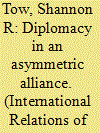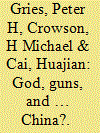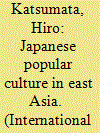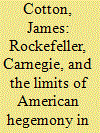|
|
|
Sort Order |
|
|
|
Items / Page
|
|
|
|
|
|
|
| Srl | Item |
| 1 |
ID:
110242


|
|
|
|
|
| Publication |
2012.
|
| Summary/Abstract |
There is an assumption in international relations literature that junior allies must choose between supporting a dominant global alliance partner and engaging with a rising power. Yet, Australian policy-makers have paradoxically managed to deepen Sino-Australian relations despite their bilateral alliance with the United States. They have developed a discrete China policy on the assumption that they could persuade Washington to accept it over time. They reasoned that this outcome was more likely if Australia used diplomacy to facilitate Sino-American cooperation and to develop an Australian China policy non-prejudicial to ANZUS. This article explores how this 'diplomatic formula' supported expansion of Sino-Australian relations under the Whitlam, Hawke, and Howard Governments. It explains Australia's intra-alliance influence and paradoxical foreign policy behavior and contributes to understanding the dynamics of asymmetric alliances during power transition.
|
|
|
|
|
|
|
|
|
|
|
|
|
|
|
|
| 2 |
ID:
110240


|
|
|
|
|
| Publication |
2012.
|
| Summary/Abstract |
What impact does ideology have on American attitudes and policy preferences toward China? Based on two large N surveys, we first utilize exploratory factor analysis to uncover six distinct American ideological dimensions and two distinct dimensions of attitudes toward China that distinguish between its government and its people. We then utilize structural equation modeling to explore how attitudes toward the Chinese people (i.e. prejudice) and attitudes toward the Chinese government differentially mediate relationships between ideological beliefs, on the one hand, and Americans' China policy preferences, on the other. Results suggest both direct and indirect effects of ideology on policy preferences, with the latter effects being differentially mediated by prejudice and attitudes toward the Chinese government.
|
|
|
|
|
|
|
|
|
|
|
|
|
|
|
|
| 3 |
ID:
110244


|
|
|
|
|
| Publication |
2012.
|
| Summary/Abstract |
This article seeks to enhance our understanding of an East Asian community by focusing on its cultural aspect. The specific focus of analysis is Japanese popular culture, whose elements include J-pop music, TV dramas, movies, manga (comic books), and anime (animations). This article sheds light on the progress of community building in the cultural sphere by demonstrating that Japanese popular culture has been favored by the people in the East Asian region. By so doing, it modifies our common beliefs about the characteristics of an East Asian community and our conventional expectations of the nature of an East Asian regional identity.
|
|
|
|
|
|
|
|
|
|
|
|
|
|
|
|
| 4 |
ID:
110243


|
|
|
|
|
| Publication |
2012.
|
| Summary/Abstract |
In 2009, Korea and the European Union (EU) signed a free trade agreement. Using a traditional list of state goals in foreign policy - national security, economic growth, prestige-seeking, and values-promotion - I examine the prospects for cooperation and integration in the future. I find that deeper engagement is unlikely. Most importantly, neither side is relevant to the basic security issues of the other. Specifically, the EU cannot assist Korea in its acute security dilemma, and 'sovereigntist' Korea does not share EU preferences for soft power, regionalization, and multilateral collective security. However, Korea is likely to pursue the relationship for cost-free prestige-taking. And the EU will understand this 'Asian bridge' as a success for the promotion of liberal-democratic values in a non-European context. Pro-regionalist elites, most notably the 'eureaucracy', may pursue 'inter-regional' ties for internal institutional reasons, but deep Korean attachment to the Westphalian state model will likely stymie such efforts.
|
|
|
|
|
|
|
|
|
|
|
|
|
|
|
|
| 5 |
ID:
110245


|
|
|
|
|
| Publication |
2012.
|
| Summary/Abstract |
This essay contributes to the emerging debate on the origins of international studies, focusing on evidence regarding Australia. While neither Carnegie nor Rockefeller had a primary interest in international studies, the largest US foundations had a major impact on the emergence of the subject in Australia ca. 1920-60. This impact was direct, through the provision of funding to individuals (via fellowships) as well as to organizations; it was also indirect by virtue of the support given to the Institute of Pacific Relations (a proportion of which was actually for specific Australian purposes). How this impact is to be characterized turns in part on methodological questions; it cannot however be seen as a clear case of the imposition of Gramscian-style hegemony in the realm of ideas. The most apparent influence of the foundations was to direct the attention of a selected body of Australian intellectuals, of sometimes diverse views, beyond Empire to transnational concerns.
|
|
|
|
|
|
|
|
|
|
|
|
|
|
|
|
| 6 |
ID:
110241


|
|
|
|
|
| Publication |
2012.
|
| Summary/Abstract |
This study sets out to analyze strategic relations of two major donors - the United States and China - in delivering food aid to North Korea in the 1990s. By reviewing the historical evolution of US-China strategic relations in line with food aid and adopting a game model to verify historical findings, it addresses two significant observations. First, the North Korean food aid dynamics were constructed and crystallized by donors' strategic interactions, rather than humanitarian intention to save the famine-stricken North Korea. Both donors first took into account strategic interests in aid dynamics, and then utilized food aid as a strategic instrument for their own purposes. Second, any multilateral cooperation for delivering food aid to North Korea dooms to failure, despite the potential of aid coordination among donor states. Donors' competition for the primacy in the region of Northeast Asia hampered policy coordination for institutionalizing aid networks. It is concluded that the two donors were bound to strategize food aid as a logical outgrowth of their own interests in the wake of North Korea's humanitarian disasters.
|
|
|
|
|
|
|
|
|
|
|
|
|
|
|
|
|
|
|
|
|